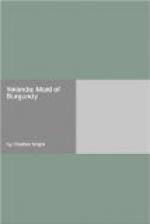“From a just cause, my lord,” quickly retorted Max.
“I fear I have had the worst of this encounter, Hymbercourt,” said the duke, smiling, “and I see nothing left for me but apology.”
“I sincerely hope Your Grace will not embarrass us by apologizing,” said Max.
Charles hesitated, gave a short laugh, and apologized by placing his hand on Max’s shoulder.
“Let us go into the little parley room,” he said. “Hymbercourt, lead the way with Sir Max; Sir Karl and I will follow presently.”
Max and Hymbercourt passed out at a small door near the throne, and the duke turned to me:—
“I like the boy’s modest boldness, and I hope that I may induce him and you to accompany me against the Swiss. I would not accept his offer made on the spur of the moment, but if, on talking it over with him, you make up your minds to come with me, I will make it well worth your while. This war will be but a May-day outing. We’ll speak on the subject again. Meantime, I understand that you and Sir Max wish to remain incognito at Peronne?”
“We do, Your Grace,” I responded. “I fear it will be impossible to accept the honor you have offered, but, as you have graciously said, we will, if you wish, speak of it again.”
“I am content,” said the duke. “Let us follow Hymbercourt.”
CHAPTER XIV
SIR KARL MEETS THE PRINCESS
The duke and I passed through the door by which Max and Hymbercourt had left the hall, and entered a narrow passageway eight or ten yards long, having two doors at the farther end. The door to the right, I soon learned, led to the little parley room where Max and Hymbercourt had gone. The door to the left opened into a staircase that led to the apartments of the duchess. A narrow flight of stone steps that led from the ladies’ gallery opened into the passage, and, just as the duke entered in advance of me, two ladies emerged from the stairs. They did not see me in the shadow, and supposed that the duke was alone. The taller, who I soon learned was the duchess, hastened down the passage and through the door leading to her apartments. The smaller I at once recognized. She was Yolanda.
“Father, you cannot mean to send me into France,” she cried, trying to detain the duke. “Kill me, father, if you will, but do not send me to that hated land. I shall not survive this marriage a fortnight, and if I die, Burgundy will go to our cousin of Bourbon.”
“Don’t hinder me, daughter,” returned the duke, impatiently. “Don’t you see we are not alone?”
Yolanda turned in surprise toward me, and the duke said:—
“Go by the right door, Sir Karl. I will be with you at once. I wish to speak with the duchess.”
He hurriedly followed his wife and left me alone with Yolanda.
“Fraeulein, my intrusion was unintentional,” I stammered. “I followed the duke at his request.”




